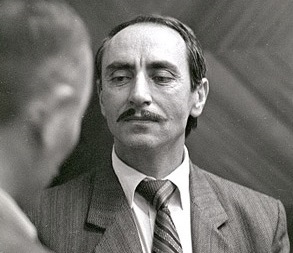
History 03/03/20 Vikipediisto would become of Russia if Chechnya seceded in the 1990s,
, Such an alternative was very real. Since October, 1991 to November 1994 and from September 1996 through August 1999, Chechnya was de facto an independent state. It is not subordinate to the Federal authorities. Last name only the number of the Chechen Republic as part of Russia and suffered the actual situation. Moreover, 12 may 1997 between Russia and Chechnya was signed the relationship agreement, as between two sovereign subjects of international law. Obviously, when in August 1999 the Second Chechen war, the potential for peaceful relations have been exhausted. But could it be otherwise?
the Emergence of Chechen de facto independence
Political events in Chechnya, at first, fit into the scheme of confrontation between “democratic” and “conservative” forces and was closely associated with the name of fighting Soviet General aviation, an active participant in the Soviet operation in Afghanistan, Dzhokhar Dudayev. By the way, the rank of General Dudayev received a year earlier Rutskoi and Lebed. Commanding 326-th heavy bomber division based in the Baltic States, Dudayev has earned popularity as the leader of the democratic movement in the Soviet Union for its support for the independence of the Baltic republics. In November 1990, the opposition Chechen national Congress (CHNS) in absentia elected Dudayev as its Chairman. Was then Dudayev and good personal relations with Yeltsin.
After the events of August 1991 was the start of a powerful movement against the official authorities of the Chechen-Ingush Republic (CHIR), who supported the putsch. Headed the movement, the United Congress of the Chechen people (NCCP), which was transformed CHNS. 4 September, armed supporters of the NCCP started to seize government buildings and the television station in Grozny, and September 6 was dispersed by the Supreme Council of the Republic. It is obvious that these daysand crucial to maintain control of the Federal center over Chechnya. Yeltsin has lost the initiative, and it passed into the hands of local radicals. Meanwhile, if Yeltsin in the first days after the suppression of the coup itself, his decree would dismiss sun CIR, the further adverse developments might have been avoided.
After the actual seizure of power by Pro-Dudayev in Grozny arrived for talks Chairman of the Russian armed forces, Chechen Ruslan Khasbulatov. He managed to negotiate the creation of the Provisional Supreme Council (BBC) of CHIR and to hold early elections in November 1991. On 1 October, the air force decided on the division of CHIR on two national republics, each of which has now gone its own way. The situation continued to worsen. October 6, supporters of Dudayev made a new coup, dispersed the force, and on 27 October 1991, the NCCP has conducted elections in which the President of Chechnya was elected Dudayev. November 1, he declared the independence of Chechnya.
Yeltsin immediately tried by force to bring Chechnya into submission, however, allocated to them for this effort was clearly inadequate, and they were trapped in the airport of Grozny. After that between the Federal center and Chechnya began the “war of declarations”. Within Chechnya, Dudayev had to face strong opposition. To combat it he set in 1993, his personal dictatorship.
the Spread of Islamic fundamentalism in Chechnya
Some experts (in particular, the famous Russian expert on Islam Roman Silantyev) think that Chechnya and the entire North Caucasus was in the early 90-ies of the selected Wahhabist centers in Saudi Arabia to promote his teachings and rejection of these Russian territories to create in them an Islamic state. Many also believe that the activity of the Wahhabis became a secondary phenomenon, after the region came into confrontation with Moscow because of its unwillingness to recognize its independence. So, in 2004, the observer of MK Yulia Kalinina said:
“If in 1990-91, the first years Chechnya was listed as the sixteenth Soviet socialist Republic, there would be no problem – she would be separated as gently as Uzbekistan or Ukraine. Yes, Russian out there had to leave. But they’re from Kazakhstan fled by the thousands, and many more where. But there would have now no “Nord-OST” or Beslan or habitual expectations of terrorist attacks.”
the First years of independence of Chechnya, it remained a secular judicial system, inherited from the Soviet era. Only in 1995, during the first war with Russia, Dudayev ordered the creation in Chechnya of the first Sharia courts. They initially functioned along with the secular, and only in late 1996, at the end of the war, when his successor Z. iandarbiev, the secular courts were abolished. Dudayev himself adhered to traditional Islam. And in 1998, a year before the outbreak of the Second Chechen campaign, the President of Ichkeria Aslan Maskhadov declared Wahhabism in the Republic outside the law.
it is Likely that the claim that a wide spread in Chechnya, radical Islam to a greater extent was a response to Russia’s military actions have reason.
it is Characteristic that Russia did not immediately recognize the beginning of the First Chechen campaign. She announced about it only 11 December 1994. Meanwhile, on 26 November 1994 the Chechen opposition unsuccessfully stormed the presidential Palace in Grozny. The detachment of the opposition were Russian soldiers.
Two equally unprovable point of view
so, with all the nuances, there are two main points of view on how to develop relations between Russia and Chechnya if Russia did not prevent the independence of Chechnya in 1991. According to one of them, already cited above, Russia should have done that. Care what would happen within Chechnya itself. We had to evacuate out of Chechnya of the Russian population, to grant Chechnya its own internal squabbles, and the Chechens are not allowed in Russia. Then, I think the supporters of this concept, Russia not being swept away by the wave of terrorism.
supporters of the alternative point of view (the same Silantyev, for example) indicate that in 1999, Wahhabi militants from Chechnya began the aggression in the neighbouring republics. Therefore, to prevent such aggression and terrorist acts in Russia was necessary the direct control of Russia over the whole territory of Chechnya. In addition (this motif is clearly expressed in replicas of ordinary citizens that have shown, for example, the discussion on the radio “Freedom” in September 2004), many believe that the granting of independence to Chechnya would cause a chain reaction of secession from Russia other republics of the North Caucasus, Tatarstan, Yakutia, etc.
it is Characteristic that from both points of view, it follows that the incompleteness of the First Chechen campaign, inevitably, spawned the Second, although I understand that incompleteness in different ways. Prove also that realized exactly that, and not other variant of development of events is impossible.
Many Russian citizens do not think that Chechnya’s secession would create a precedent for other republics, and besides, I don’t want the Chechens were citizens of the same state. In June 2013, “Levada-center” conducted a public opinion poll on the situation in the North Caucasus. One of the questions was: “How would you react to the possibility of separation of Chechnya from Russia?” Only 10% of respondents said that it ought to prevent by all means, including military. 13% were against it, but are willing to accept, 27% treated it with indifference, and 24% would like such a scenario. 12% believed that Chechnya in fact has already seceded from Russia. In that year this question was asked last time.
Source:
© Russian Seven
Featured articles Share: Comments Comments on the article “What would happen to Russia if Chechnya seceded in the 1990s,” PerhapsSTA log in to leave a comment! br>
Share on Tumblr
















